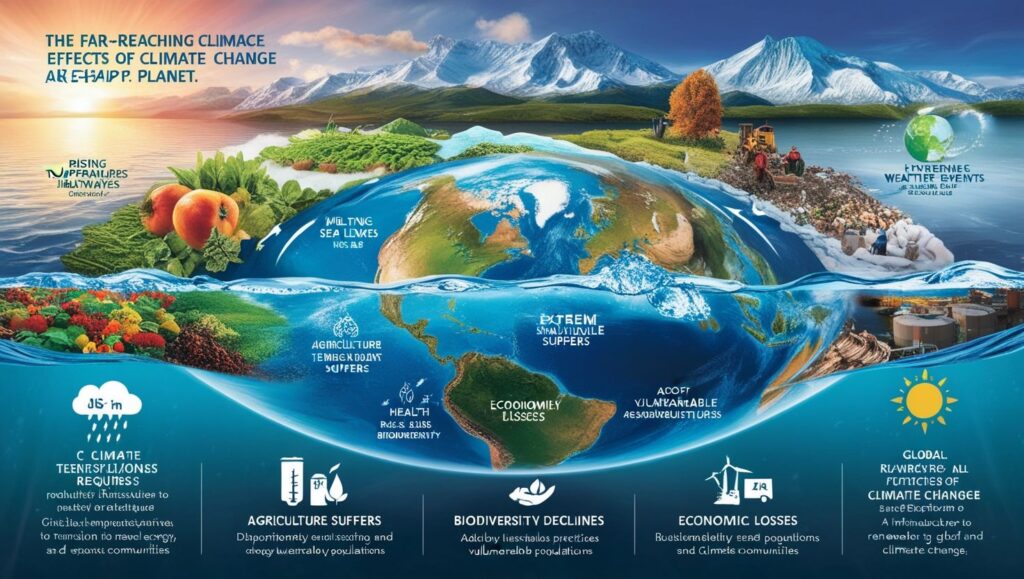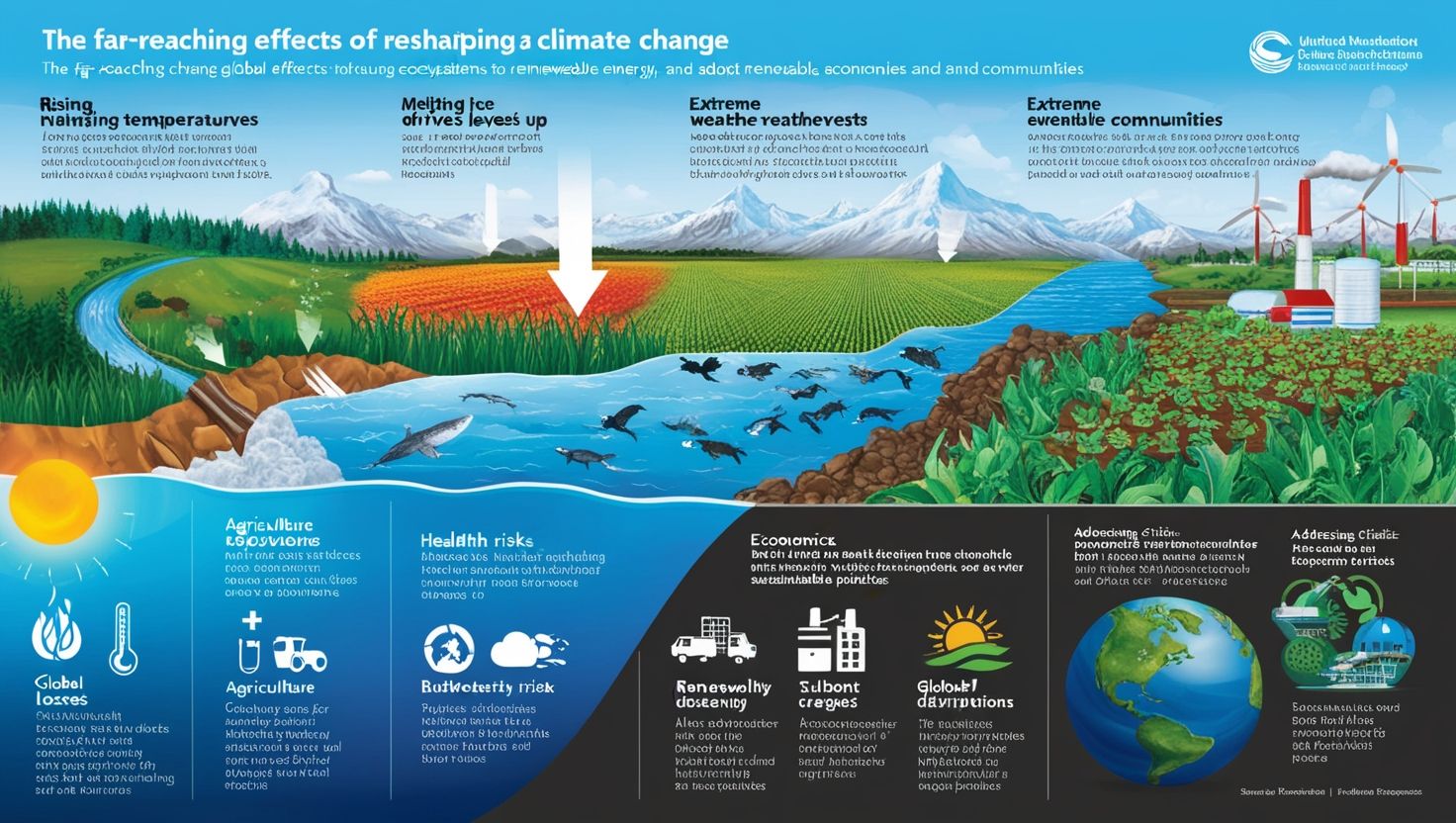The Far-Reaching Effects of Climate Change, Climate change, a pressing global issue, is reshaping the Earth in profound and far-reaching ways. Driven by the accumulation of greenhouse gases like carbon dioxide and methane, the planet’s warming is disrupting ecosystems, economies, and human communities. The consequences of climate change are already evident, and projections suggest increasingly severe impacts if action is not taken. This article explores the multifaceted effects of climate change across environmental, economic, and social domains.
Environmental Impacts
- Rising Temperatures and Heatwaves
The global average temperature has risen by about 1.2°C since pre-industrial times. This warming trend has led to an increase in the frequency and intensity of heatwaves. Prolonged periods of extreme heat stress ecosystems and endanger human health, particularly in urban areas with dense populations. - Melting Ice and Rising Sea Levels
The warming atmosphere has caused glaciers and polar ice caps to melt at unprecedented rates. Arctic sea ice is shrinking, while the melting of Greenland and Antarctic ice sheets contributes to rising sea levels. According to recent studies, sea levels are rising at an average rate of 3.4 mm per year, threatening coastal communities and island nations with flooding and erosion. - Biodiversity Loss
Altered climates disrupt habitats, leading to the extinction of species unable to adapt. Coral reefs, for example, suffer from bleaching due to warmer waters, impacting marine biodiversity and the livelihoods of communities dependent on fishing. Land-based ecosystems are also shifting, with forests at risk of disease and fires. - Extreme Weather Events
Climate change intensifies weather patterns, leading to more frequent and severe storms, hurricanes, droughts, and floods. These events not only destroy infrastructure but also displace millions of people annually, creating climate refugees.
Economic Consequences
- Agricultural Disruption
Shifting weather patterns and extreme conditions significantly impact agriculture. Prolonged droughts reduce crop yields, while unpredictable rainfall affects planting cycles. Regions dependent on agriculture, such as Sub-Saharan Africa and South Asia, face heightened food insecurity. - Infrastructure Damage
Coastal flooding, hurricanes, and wildfires damage critical infrastructure, from roads to power grids. Reconstruction efforts strain local and national budgets, diverting funds from other development projects. - Rising Costs of Living
Scarcity of resources like water and arable land drives up prices for essential goods. Additionally, governments and industries face increased costs for climate mitigation and adaptation measures. - Disruption to Global Trade
Climate-related disruptions to transportation networks, such as flooded ports or storm-damaged supply chains, destabilize global trade. Industries like insurance and tourism also bear heavy losses.

Social and Health Impacts
- Health Risks
Rising temperatures exacerbate heat-related illnesses, cardiovascular diseases, and respiratory conditions. Air quality worsens due to wildfires and increased pollen production, while warmer climates expand the range of vector-borne diseases like malaria and dengue fever. - Inequality Amplification
Climate change disproportionately affects marginalized communities, particularly those in developing nations with limited resources to adapt. - Migration and Conflict
Water scarcity, agricultural failures, and natural disasters drive mass migrations. Competition over dwindling resources may spark conflicts, further destabilizing regions already facing political or economic challenges.
Addressing the Crisis
To mitigate these impacts, a global, unified response is essential. This includes reducing greenhouse gas emissions, transitioning to renewable energy, and investing in climate-resilient infrastructure. International agreements like the Paris Accord aim to limit global warming to below 2°C, but success depends on the commitment of nations, industries, and individuals.
Adaptation strategies, such as sustainable agriculture, water conservation, and disaster preparedness, also play a crucial role. Empowering vulnerable communities with the tools and knowledge to withstand climate challenges is equally important.
Conclusion
The Far-Reaching Effects of Climate Change, Climate change is not a distant threat but a present-day reality affecting all aspects of life on Earth. While the challenges are immense, they are not insurmountable. By acting decisively and collaboratively, humanity can mitigate the worst effects of climate change and secure a sustainable future for generations to come. The time to act is now.

Some truly nice and utilitarian information on this site, besides I conceive the layout holds fantastic features.
mkuzym
Some really nice and utilitarian info on this site, also I believe the design has got fantastic features.
You should participate in a contest for the most effective blogs on the web. I’ll suggest this website!
Heya i am for the first time here. I came across this board and I in finding It really helpful & it helped me out a lot. I’m hoping to offer one thing again and aid others like you helped me.
You are my intake, I possess few blogs and occasionally run out from to brand.
Hi, I think your site might be having browser compatibility issues. When I look at your website in Safari, it looks fine but when opening in Internet Explorer, it has some overlapping. I just wanted to give you a quick heads up! Other then that, fantastic blog!
Fantastic site. A lot of helpful info here. I’m sending it to some buddies ans also sharing in delicious. And certainly, thanks on your effort!
Well I truly enjoyed reading it. This post procured by you is very constructive for proper planning.
It’s actually a nice and useful piece of info. I’m happy that you shared this useful information with us. Please stay us up to date like this. Thanks for sharing.
This actually answered my downside, thank you!
Thanks for another great article. Where else could anyone get that kind of information in such an ideal way of writing? I’ve a presentation next week, and I’m on the look for such information.
I am often to blogging and i really appreciate your content. The article has really peaks my interest. I am going to bookmark your site and keep checking for new information.
Hello. magnificent job. I did not expect this. This is a great story. Thanks!
I conceive other website proprietors should take this website as an example , very clean and great user friendly style and design.
Thank you for sharing superb informations. Your website is so cool. I’m impressed by the details that you have on this site. It reveals how nicely you perceive this subject. Bookmarked this website page, will come back for extra articles. You, my friend, ROCK! I found simply the info I already searched everywhere and just could not come across. What an ideal website.